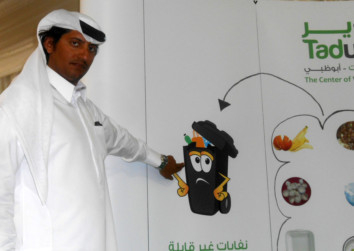
Abu Dhabi: ‘Smart bins’ can now track how much rubbish people are throwing away — meaning households who are producing excessive waste can be identified.
A campaign to segregate waste by the Centre of Waste Management-Abu Dhabi (CWM) is being expanded into new areas. The centre is installing 30,000 smart bins in neighbourhoods, which are monitored by advanced radio-frequency identification (RFID) remote sensor systems. Volunteers helping out in the campaign told surprised householders the bins can track how much waste they are throwing away.
Each waste bin has an electronic chip with its geographic and technical details, which can be read by a device in waste collection trucks (through RFID technology)
The device is linked to a central monitoring station, which ensures timely collection of waste from containers and their periodic washing.
Alarm
“If a waste collection truck passes a bin without collecting waste from it an alarm will ring,” a senior official told Gulf News on Tuesday.
There are 15,000 green bins for recyclable waste and 15,000 black bins, Ahmad Al Suwaidi, contract manager for waste collection and cleaning at the CWM, said.
Residents were asked to segregate waste during an awareness drive at Khalifa City A.
Weight
“We can identify those who do not follow this instruction in real time. The weight of the green bin [recyclable] will always be lighter than the black bin. If the green bins are found to be heavier than black bins or if both are even equal in weight, we can conclude that families are not properly segregating the waste,” Al Suwaidi said.
The emirate generates 33,000 tonnes of waste per day — more than ten million annually. Per capita waste generation in the emirate is 1.8 to 2 kilos per day.
However, the amount of recycled waste was not readily available.
The centre employees and volunteers Mawalif and Takatof, act as environmental guides in the campaign.
The campaign covers Mohammad Bin Zayed City, Mussafah Commercial Area, Al Shawamekh, Abu Dhabi Gate City, Bain Al Jessrain, the Officers City area and Khalifa City A.
Eisa Saif Al Qubaisi, General Manager of CWM said the campaign aimed to achieve active community participation and enhance awareness about sustainable waste management.
“We believe this will reflect positively on the general appearance of all neighbourhoods. The important issues of waste reduction, reuse and recycling will also be highlighted.”
Hani Hosni, Acting Executive Director of Strategy and Business Development at CWM, said the campaign will help improve general hygiene and environmental safety.












